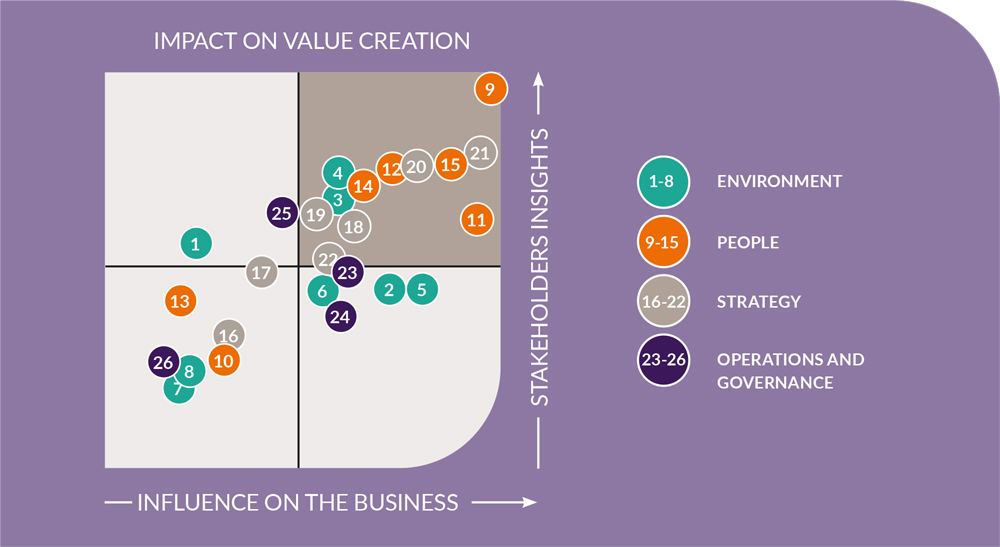Sustainability
Focus on the essential
The materiality assessment provides guidance in the choice of content in this sustainability report, the strategic direction and how to integrate sustainability throughout AddLife’s business.
Materiality is the point at which a sustainability topic becomes relevant to the ability to create lasting value. In 2021, a future-focused assessment to see how priorities are evolving was conducted. The assessment allows better understanding of expectations from customers, employees, investors, suppliers and society, how sustainability influences the strategic direction and the group’s impacts on people and the planet to 2030.
AddLife's most material topics are issues that substantively:
- Reflect the significant economic, environmental and social impacts
- Influence the ability to create lasting value, build trust and reduce risks
- Influence stakeholders’ perception of AddLife's performance and ability to deliver value to them
The process engaged group management, internal experts, customers, suppliers, employees, investors and representatives of society and comprised of five steps:
- Navigating 2030 – Reviewed research on how the industry will be influenced by four macrotrends to 2030—Access to resources, Demographic shifts, A changing environment, and an Interconnected world.
- Internal ranking and weighting – 15 internal experts weighted and ranked 26 topics across four areas relating to environmental and people impacts, strategic imperatives and operations and governance.
- Deep-dive interviews and surveys – By combining 16 stakeholder interviews, 16 responses to customer and supplier surveys and the insights from employee survey, a validation and adjustment of the ranking and additional knowledge was added.
- Strategize – The outcome of the assessment served as foundation for our new sustainability strategy which was presented in 2022.
Our top six take-aways:
- Sustainability is set to increase in importance, driven by investor, employee and customer expectations and changing business landscape.
- Environment-related topics and their influence on the ability to create value are expected to increase.
- Talent management, responsible sourcing and material traceability influence AddLife’s ability to create value. Their importance to stakeholders is not as high.
- Stakeholders hold AddLife accountable for monitoring and assessing supplier sustainability risks.
- AddLife’s purpose and ability to contribute to society are important to attracting new talent. Skills development is key to retaining and empowering talent.
- Expectations from employees on the importance of work-life balance and well-being are high.

|
ENVIRONMENT 1. Energy use and efficiency 2. Climate impact along the supply chain 3. Plastics 4. Packaging 5. Responsible sourcing 6. Circularity 7. Water efficiency 8. Biodiversity loss and ecosystems
|
STRATEGY 16. Fair pricing 17. Ethical marketing and labelling 18. Multi-stakeholder collaboration 19. Product and service innovation 20. Business model innovation 21. Long-term growth and sustainable development 22. Access to healthcare |
|
PEOPLE 9. Product quality and service 10. Community involvement 11. Talent attraction and retention 12. Employee health and well-being 13. Occupational health & safety 14. Diversity and inclusion 15. Patient well-being |
OPERATIONS AND GOVERNANCE 23. Data protection and privacy 24. Human and labor rights 25. Ethical business practices 26. Taxes paid
|